Turning Hurricane Debris into Biochar at Mountainwise Farm
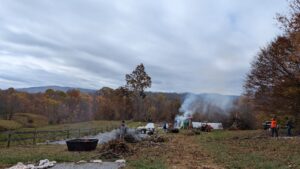
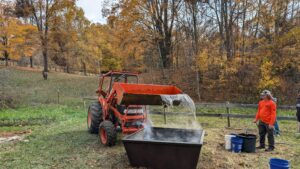
Mountainwise Farm faced significant damage from Hurricane Helene, including downed trees and the loss of several high tunnels. In response, the Nexus team brought three Oregon kilns and a Ring of Fire to the farm to convert the brush piles into biochar. With invaluable help from several students in the STBE and Music departments, the Nexus team and Tyler Hoskinson, owner of Mountainwise Farm, worked together to collect fallen trees, cut them, and transform them into biochar, demonstrating the teamwork and resiliency of the community. The students who willingly volunteered their Sunday afternoon made the day a true reflection of community spirit. Tyler’s thoughtful gestures—delicious ginger pumpkin soup and bread, and a special treat of farm-grown fresh ginger—made the day even more memorable.
Beginning farmer workshop: Nexus greenhouse heating system
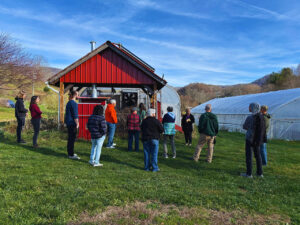
On November 17, the Patterson School Foundation hosted a workshop designed to support new farmers and ranchers. Funded by a USDA grant, the event focused on efficient greenhouse heating technologies, an essential topic for those looking to build or improve their greenhouses. The group gathered for a tour of the Nexus facility, where they explored sustainable heating solutions as well as other practical technologies. Participants then visited the Nexus heating system at Springhouse Farm and Against The Grain Farm, where they learned about the practical application of root zone heating, a method that promises both energy efficiency and crop health. A highlight of the workshop was a local farmers Q&A session, where experienced farmers shared their insights and answered questions, providing valuable knowledge to those just starting out in the world of farming.
Biochar Co-Composting and Soil Application study
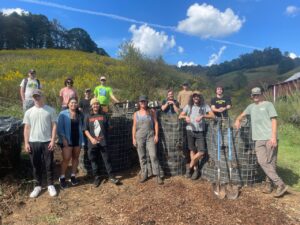
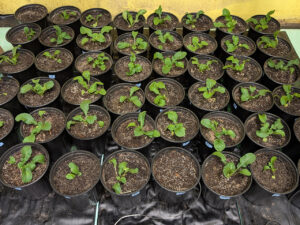
This project aims to optimize biochar co-composting methods to enhance soil health and plant growth. Biochar’s high surface area and porosity create an environment that supports microbial activity, stabilizes moisture, and enhances nutrient retention. The heat generated during composting further increases biochar’s capacity to adsorb essential nutrients and minerals. Research indicates that co-composting biochar from the beginning of the composting process has a synergistic effect compared to adding it after composting. Key research questions include assessing the effects of different biochar application methods on soil and plants and comparing commercial biochar with on-farm-produced biochar.
The project involves small-scale experiments at Nexus to identify the best biochar co-composting recipe through three experimental series, varying the type and ratio of biochar mixed with raw materials. Softwood and hardwood biochar are tested at different concentrations (0%, 5%, and 10% by mass), with a potential lower-ratio trial in the third series. Field applications at Springhouse Farm in Vilas will further examine the differences between commercial and farm-produced biochar in terms of soil quality and crop yield. The goal is to develop an easy-to-follow biochar co-composting guide for local farmers, making sustainable soil enhancement practices more accessible and effective.
Slaughterhouse Waste-to-Nutrients Project: Closing the Loop on Organic Waste
The Slaughterhouse Waste-to-Nutrients project aims to create a sustainable solution for managing organic waste from decentralized animal processing facilities, such as the newly approved Kill/Chill facility in Watauga. Currently, the facility plans to landfill all non-marketable byproducts—an unsustainable practice that undermines the environmental benefits of rotational grazing and results in a one-way loss of nutrients from the region.
This project seeks to integrate bioenergy technologies to efficiently convert these organic wastes into high-value nutrients and soil amendments. App State’s Biochar Combined Anaerobic Digestion process, paired with aerated static composting, will be tested to maximize resource recovery.
In December, the Nexus team toured the Piedmont Meat Processing, collected non-marketable product samples, and began testing to determine the biomethane potential of offal and the phosphorus bioavailability of bone char. These efforts mark an important step toward turning waste into valuable resources for the region.
